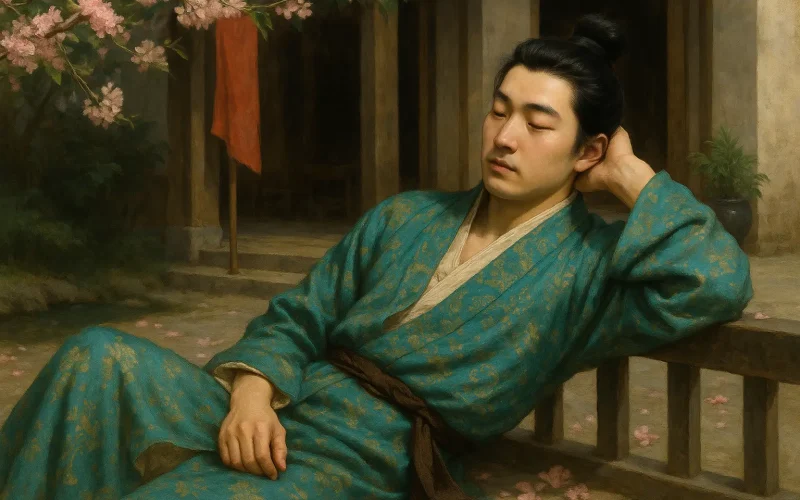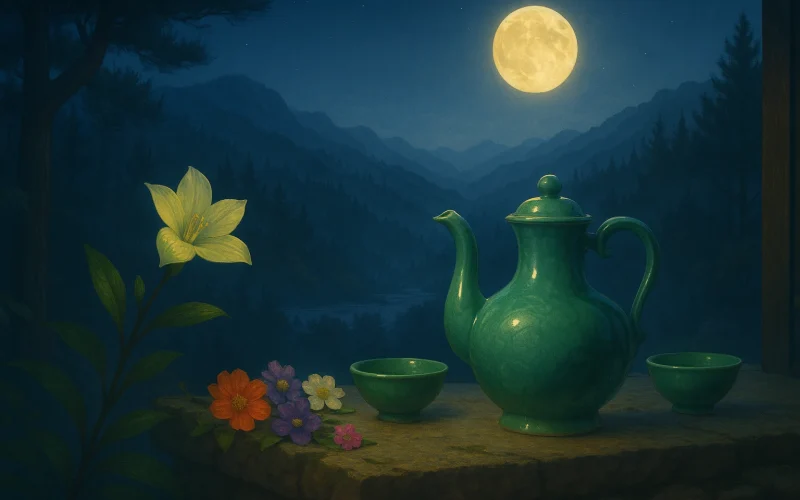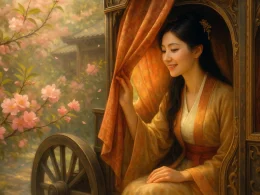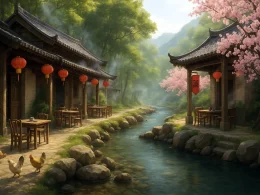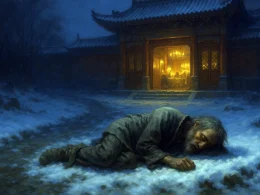South of the River, wine is brewed on Pure Bright Day,
Where high green streamers in the wind softly sway.
A carefree young man from who knows where lies in rest,
His face covered with petals, still drunk in his nest.
Original Poem
「春思二首 · 其二」
陆龟蒙
江南酒熟清明天,高高绿旆当风悬。
谁家无事少年子,满面落花犹醉眠。
Interpretation
This poem was composed during the late Tang Dynasty, a period when the Jiangnan region was flourishing, especially in spring. The Qingming Festival was marked by the brewing of new wine, and tavern flags fluttered everywhere in the wind. Through his characteristically leisurely perspective, the poet captures a scene of carefree youth indulging in blossoms and wine. As part of a series called "Spring Thoughts," this piece focuses on depicting local customs and human sentiments, reflecting the poet’s dual lament for the fleetingness of youth and the beauty of spring.
First Couplet: "江南酒熟清明天,高高绿旆当风悬。"
Jiāngnán jiǔ shú qīngmíng tiān, gāogāo lǜ pèi dāng fēng xuán.
South of the River, wine is ripe for Qingming Day;
Tall green tavern flags flutter high in the wind.
These lines establish the time and setting: a Jiangnan spring, with Qingming as the season for drinking. The green flags (绿旆 lǜ pèi) swaying in the wind create a vivid image. The tavern flags are not just symbols of local custom but also suggest the liveliness and vitality of spring. With concise and lively description, the poet vividly portrays the seasonal atmosphere.
Second Couplet: "谁家无事少年子,满面落花犹醉眠。"
Shuí jiā wúshì shàonián zǐ, mǎnmiàn luòhuā yóu zuì mián.
What family’s idle young man is this,
His face covered with fallen blossoms, still drunk in sleep?
This couplet shifts to human elements within the spring scene. A carefree youth,沉醉 (chénzuì, intoxicated) with wine and flowers, lies asleep with petals scattered across his face, forming an image of intoxicated spring beauty. "Still drunk in sleep" (犹醉眠 yóu zuì mián) conveys a sense of unrestrained leisure, capturing the untamed spirit of youth while harmonizing with the vitality of spring.
Holistic Appreciation
This work depicts the customs of Jiangnan during the Qingming Festival, moving from tavern flags to a drunken youth in a smooth and vibrant narrative. Breaking from the traditional tone of spring sorrow or lament, the poet combines human emotions with physical imagery through detailed depiction, creating a bright and liberated spring atmosphere.
The first couplet sets the scene with green flags waving and new wine ready, evoking strong local flavor. The second couplet portrays human figures—a youth sleeping off his drunkenness, petals on his face—conveying the leisure of youth and the warmth of spring. Scene and human elements reflect each other, filling the poem with the breath of life and aesthetic charm. Simultaneously, an underlying lament is implied: though spring is beautiful and youth vigorous, both are transient. The poet freezes this moment of youth in "drunken sleep," embedding a touch of wistfulness within the bright scene.
Artistic Merits
- Scene and human elements blended: The first couplet depicts flags and Qingming, the second the sleeping youth—nature and human activity complement each other, forming a complete picture of local customs.
- Vivid and expressive details: "Green flags flutter in the wind" (绿旆当风悬) and "face covered with fallen blossoms" (满面落花) are exquisite touches—colorful, dynamic, and highly visual.
- Fresh and natural language: The twenty-eight characters are utterly unadorned, plain as speech, yet rich in emotion, embodying Lu’s simple and enduring style.
- Leisurely and bright tone: Instead of sorrow over spring or aging, the poem uses a cheerful and relaxed brush to portray spring’s beauty and youth’s spirit, diverging from the melancholic tone common in late Tang poetry.
- Emotion implied through scenery: Though depicting the romantic abandon of a drunken youth, the poet—no longer in his own youth—hints at a lament for the passing of spring and youth, creating subtle artistic tension.
Insights
By portraying Jiangnan drinking customs and a drunken youth during Qingming, this work reminds us: both youth and spring are transient, and one must seek joy in the present to truly honor the passage of time. It encourages readers to cherish beautiful moments, and while appreciating the scenery and joys of life, to also sense the poet’s deep understanding of life’s rhythms.
About the Poet
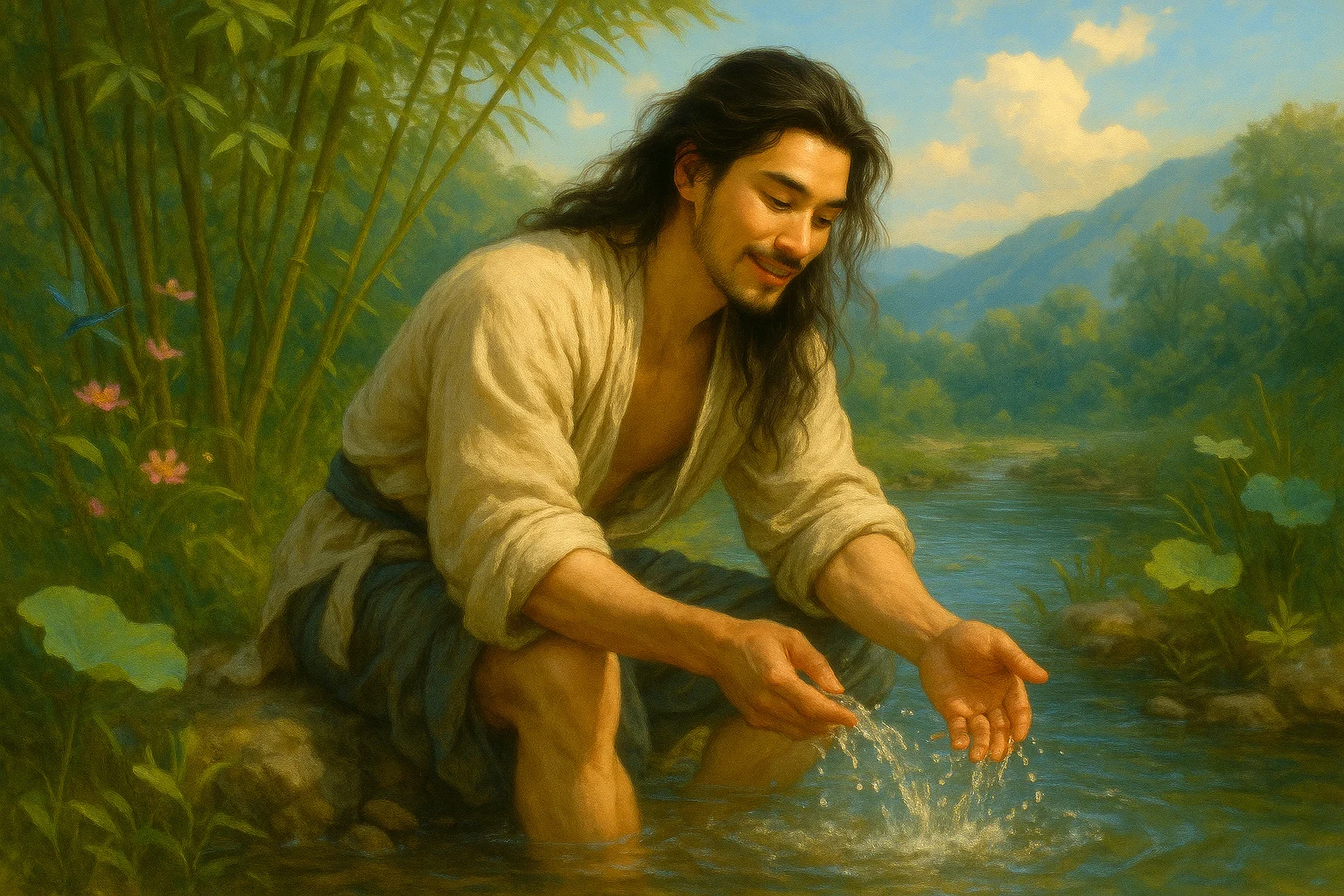
Lu Guimeng (陆龟蒙 ?– c. 881 CE), a native of Suzhou, Jiangsu, was a Late Tang dynasty writer and agronomist. After failing the imperial examinations, he retreated to a reclusive life in Puli, Songjiang. He formed a famous literary partnership with the poet Pi Rixiu, and the pair are often referred to collectively as "Pi-Lu." His poetry is known for its social satire and a style that is incisive yet subtly restrained. His inclusion in the Biographies of Talents of the Tangunderscores his significance. The modern writer Lu Xun famously praised his essays, noting that they provided "a sharp radiance piercing through a world of muddle". Lu Guimeng is regarded as a uniquely distinctive voice in the literary scene of the late Tang.






